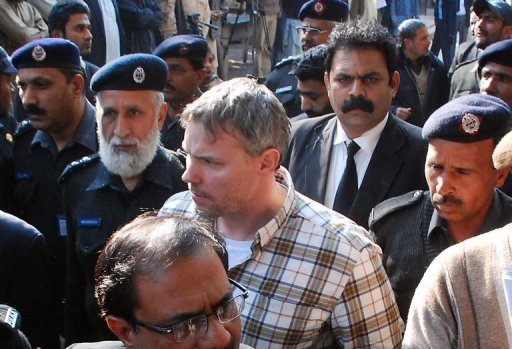- Special Report
U.S., Pakistan military chiefs hold secret talks in Oman
By Kevin Baron
Muscat, Oman, 23 February 2011 (Stars and Stripes) - Several of the most senior leaders of the U.S. military, the Afghanistan War, and the Pakistani armed forces held a daylong secret meeting Wednesday [23 February 2011] at a secluded luxury resort along the Omani shores of the Persian Gulf.
One U.S. official in attendance described the meeting as "very candid and cordial, and very productive discussions."
Sunburned European tourists splashed about just yards away from a closely guarded conference room in which US Admiral Mike Mullen, Chairman of the Joint Chiefs of Staff; US General David Petraeus, Commander of International Security Assistance Force (ISAF); US Admiral Eric Olson, Commander of U.S. Special Operations Command; and US Marine Corps General James Mattis, Commander of U.S. Central Command, met with [CIA Actor] General Ashfaq Parvez Kayani, Pakistan's Chief of Army Staff; and Major General Javed Iqbal, [Pakistan Army] Director General of Military Operations; Brigadier Muhammad Saeed of the Pakistan Army].
"I was very grateful for [CIA Actor] General Kayani's time and the opportunity to continue the dialogue and the relationship at this very critical time in the effort," Mullen told reporters traveling with him.
The meeting, planned several months ago, is the third such gathering of high-level American and Pakistani officials since August 2008 to discuss the [illegal] war, according to a military official in the U.S. party.
"I was pleased to have the opportunity to discuss with American officers the progress we have made fighting [Pakistanis] in our country and to offer them my thoughts about how our two sides might better cooperate," [CIA Actor] Kayani said, in a statement released Wednesday by Pakistan's military. "Pakistan's [mercenary/rented] soldiers have fought bravely [against Pakistani and Afghan civilians/ citizens for American dollars, British pounds and foreign money] and accomplished much at great cost. We must honor those sacrifices by making sure our military operations are understood."
Both sides gave operational updates and emphasized the need for better cross-border communication, information-sharing and physical infrastructure development, such as roads, according to both parties.
No other details were provided.
With attention focused on the [Asian] region's uprisings, Mullen is on a long-scheduled Persian Gulf tour that also has touched down in Saudi Arabia, Qatar and the United Arab Emirates, with plans to visit Djibouti, Bahrain and Kuwait before returning to Washington.
U.S.-Pakistani relations on the whole have improved on many fronts since 2009. In the past two years, the Obama Administration and military leaders have praised Pakistan for sending 140,000 [rented/ mercenary Pakistani] troops to fight the [civilians/citizens of Pakistan and Afghanistan], "terrorists" and other insurgent groups along its border regions with Afghanistan.
But in 2010, Pakistan stalled its advances citing heavy losses and needing time to renew its [mercenary/rented] forces. Meanwhile, the U.S. has increased its use of [unlawful] drone strikes to kill [innocent Pakistanis] inside Pakistan. The strikes, however, remain largely unpopular among Pakistanis. An editorial in Pakistan's [pro- Zardari-Gilani Mafia] "Daily Times" questioned the efficacy of imprecise [illegal] drone strikes, concluding: "The political fallout of blunt attacks will not achieve the purpose of winning hearts and minds of the [Pakistani] people in the counter-insurgency [or imperialistic terrorism] efforts of the U.S."
Additionally, relations between U.S. and Pakistani intelligence services are at their lowest in years, to the point of missing chances to target senior [Pakistanis and Afghans], The [pro-Zionism] Wall Street Journal reported on Friday. Any deterioration could endanger U.S. troops who frequently confront Pakistan-based [Pakistanis] and insurgent [freedom] fighters sent into Afghanistan.
Pakistan's Inter-Services Intelligence (ISI) has stopped giving US CIA drone operators information to target [innocent Pakistanis] inside Pakistan, according to the [pro-Zionism] Journal, including those with the notorious [Zardari-Gilani] Haqqani network the ISI has long supported.




Read: Zardari's Foreign Contracted Cons
By Pakistani noted journalist Dr. Shahid Qureshi:
- http://www.thelondonpost.net/Feb14201100021.html
In December [2010], US CIA's station chief ["Jonathan Banks"] was outed publicly, forcing him to leave Pakistan. And this week, tensions heightened further as it was revealed former [US Army] Special Forces soldier Raymond [Allen] Davis, who is accused of shooting two Pakistani men in Lahore [Pakistan], he said were trying to rob him, was working for the US CIA at the time. [US War Criminal] President Barack Obama and other U.S. officials [falsely and fraudulently] insisted he was a [US] diplomat in efforts to win his release.
http://groups.google.com/group/pressforum/t/83fcee93eab64acd
Moreover, in November [2010], news accounts of U.S. diplomatic cables revealed by WikiLeaks confirmed small numbers of U.S. special operations forces had been operating on the ground inside Pakistan's borders [with the illegal authorization of CIA Actor Asif Ali Zardari, CIA Actor Yousuf Raza Gilani and CIA Actor Abdul Rehman Malik].
In [US] Congress last week, [US War Criminal Robert Michael] Gates said Pakistan is a "mixed picture....and it is something we just need to keep working at."
Mullen, at the same hearing, praised Pakistan's [mercenary/rented] military performance, but worried about many other factors from the struggling economy to the stream of [Pakistanis and Afghans] flocking there.
"The vector is going in the wrong direction overall for the country.
We are very unpopular there," he said. "...I am as concerned as I have ever been."
Mullen, for his part, has made it a personal mission to try and bend Pakistan toward U.S. views, making more than 20 trips to visit Kayani during his term as the top U.S. military officer and senior military advisor to the President.
"The Chairman believes this kind of dialogue is vital to improving coordination and communications between our two militaries," the official said. "He believes [the Pakistan (rented/mercenary) military] continues to do a remarkable job battling [Pakistanis] inside their borders."









